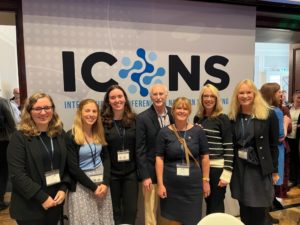![]()
On Friday 6th October, our Advocacy Lead, Portia Thorman, attended ICoNS The International Conference on Newborn Sequencing at the Royal Institution of Great Britain in London.
In this blog we explain more about genomic sequencing and some of the current projects taking place as well as a write up from the conference.
What is genomic sequencing and why does it matter for the future of our health?
DNA is the genetic information inside the body’s cells that make people who they are. It’s the instructions for how to make the body, like the code to a video game or blueprints for a house. A gene is a small section of DNA, genes control our characteristics and are passed on through generations.
A genome is the complete set of DNA sequences in an organism and contains all of the instructions required for that organism to function, including growth, responding to the environment, and healing from disease.
Whole-genome sequencing enables scientists to read a person’s individual genome and, among other things, identify differences form the average human genome. Such differences are called mutations and are often associated with disorders and disease as well as rarer conditions.
The ability to read the whole genome of a person can help to predict the likelihood of diseases occurring. This is critical to informing lifestyle choices as well as medical decisions to manage, prevent, treat or even cure certain conditions.
The ICoNs Conference, 2023
Portia says, “I was privileged to take part in the panel discussion entitled ‘The Human Element’ which focused on the real-life impact of rare diseases on families. Discussions were primarily around what genomic sequencing for newborns might look like for families in the future, and what ethical issues need to be considered.”
There are many countries around the world with similar newborn sequencing research projects, some of which are further ahead than the Generation Study with recruitment and data collection. The ICoNs conference brought together leaders of these studies to share their processes, ethical decision making and findings so far.

Attending the conference was an excellent opportunity to meet members of the Genomics England team and raise awareness of SMA. They told Portia how valuable it was to meet someone affected by rare disease, hearing her story and listening to her opinions on the importance of early diagnosis and treatment enabled them to see beyond the data and the science, grounding them back to the importance of why they are doing what they do.
Reflecting on her contribution, Portia said, “The panel discussion enabled me to talk about the wider implications of a diagnosis, how it affects the whole family and future family planning decisions. I spoke about the ethics of not finding these children before symptoms start and how science has the ability to improve treatment outcomes now, yet, due to late diagnosis and treatment, many families are living with the mental, social, and financial difficulties that come with a lifetime of complex needs and uncertainty.
This is why SMA UK, as founding members of the SMA Newborn Screening Alliance are working hard to ensure that newborn screening for SMA comes to fruition. The UK may be a world leader in genomic research, but we are lagging behind most other European countries when it comes to newborn screening for SMA and we see it as unethical to delay further the introduction of newborn screening in the UK. We know that early treatment ensures better outcomes for children and their families and with a test available that works we want to see the UK join the other 26 European countries that are already doing so.
![]()
The final reflections on the conference were summarised in an interview with Baroness Nicola Blackwood, Chair of Genomics England and a Member of the House of Lords Science and Technology Select Committee. She assured the audience that finding solutions for rare diseases is a priority for Genomics England and that she is working to raise awareness within the government of not only the benefits to the estimated 1 in 17 people affected by rare diseases but also of the huge economic benefits for the NHS and social care “
Genomics England’s research projects
Over the last twenty years, there have been dramatic advancements in genomic sequencing technologies. The time and cost required to sequence an entire human genome has massively reduced, making it feasible to have all our genomes sequenced as part of routine health care in the near future, as has been proposed by Genomics England who are one of the world leaders in the field. There are many ongoing debates regarding the ethical issues surrounding genomic sequencing.
The 100,000 Genomes Project
The 100,000 Genomics Project is a British initiative to sequence and study the role our genes play in health and disease. Recruitment was completed back in 2018 and research and analysis are still ongoing. The participants have already helped to find actionable results for many people living with rare diseases and cancer. You can find out more about the 100,000 Genomes Project here
The Generation Study
The generation study is a research project delivered by Genomics England, they will sequence the genomes of 100,000 newborns to look for a specific set of rare genetic conditions where symptoms begin before the age of five years old and where a treatment is available. The list of the 224 conditions, which includes SMA, has recently been published. You can read more about this here
Work has already begun. Genomics England want to find the best way to deliver such an ambitious project by exploring the many practical, ethical and societal questions with parents, the public, people living with rare diseases and health professionals.
Although an exciting concept, genomic screening is not a viable alternative for bloodspot screening for SMA. With a turnaround time to a diagnosis of four to six weeks, genomic screening will not give a diagnosis quickly enough for 60% of the SMA population who are born with Type 1, the severest form of the condition. It would also not speed up diagnosis for children who present with symptoms over the age of five. Onset SMA is very difficult to predict, this is just one of many ethical implications.



